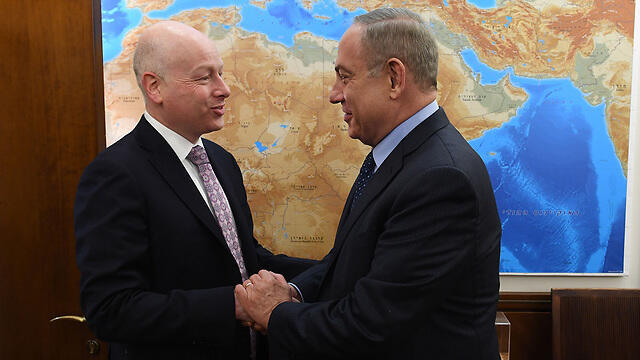Getting your Trinity Audio player ready...
The serious clashes on the Temple Mount and in the West Bank and the incident at the Israeli embassy in Amman last month were US President Donald Trump's administration's first foray into the deep end of the Israeli-Palestinian conflict. The president's special envoy to the peace process, Jason Greenblatt, traveled to the region to aid in resolving the crisis and got to see Prime Minister Benjamin Netanyahu and Palestinian President Mahmoud Abbas's outrageous and irresponsible behavior up close.
The former capitulated to demands by Bayit Yehudi Head Naftali Bennett and ignored the IDF and Shin Bet's recommendations on placing metal detectors at the Temple Mount, while the latter announced the PA was stopping security coordination with Israel at such an explosive and dangerous timing.
At the same time, Greenblatt saw how Jordan's King Abdullah resolved the crisis by putting together the deal that led to the removal of the metal detectors and the release of the Israeli embassy guard .
2 View gallery


Trump's Middle East envoy Jason Greenblatt meets with Prime Minister Netanyahu (Photo: Kobi Gideon, GPO)
(צילום: קובי גדעון, לע"מ)
These events should serve as an important lesson for Greenblatt, a diligent and smart man who takes his job seriously, as he returns to the region .If he wishes to succeed, he must encourage more involvement by regional leaders in the peace process. At the same time, he should make it clear to Netanyahu and Abbas that he is not here to manage local crises or solve their political problems, but to help reach a peace accord.
Everyone knows more or less how the peace deal would look like. The Saudi peace initiative ,which seems more relevant than ever in light of the recent changes in the Middle East, is the most convenient basis for an agreement between Israel, the Palestinians and the Arab world.
To succeed in his mission, Greenblatt needs to work to create an updated and revised version of the initiative. Its basic principles—a Palestinian state in the 1967 borders, land swaps, recognition of Israel by the entire Arab world, and an agreed upon resolution on Jerusalem—were and remain the only formula to resolving the conflict. However, there are several things Greenblatt can and should add to the initiative to make it even more relevant and adjust it to fit the current security climate.
The first, and most important, adjustment is making it clear to the Palestinians and the Arab world there would be no Right of Return to Israeli territory. The solution for the Palestinian refugees and their descendents should be found within the borders of the Palestinian state.
Another fundamental change necessary is excluding the Golan Heights from the equation: The original Saudi initiative includes Israeli withdrawal from the Golan, but today the most reasonable and responsible move for the safety of all countries in the region is the recognition of the Golan Heights as Israeli territory. As part of significant progress in the peace process, the Arab states would support such a decision.
2 View gallery


Trump's Middle East envoy Jason Greenblatt meets with Palestinian President Abbas (Photo: Reuters)
(צילום: רויטרס)
An additional change, no less important, is adding an in-depth section on security. For the citizens of Israel, this is the most important issue in any agreement. Without strict and stable security arrangements, Israel would not be able to make compromises on other issues. To that end, a comprehensive security plan should be added to the existing initiative, similar to the one prepared by US Gen. John Allen in 2013, which would include Israeli military presence in the Jordan Valley for 15 years following the signing of the agreement, as well as Israeli presence at border crossings. The Palestinian state would be demilitarized: it wouldn't have an army, but it would have a well-trained police force and internal security forces to ensure the stability of the government. Israel would maintain control over the airspace.
There is already successful security cooperation between Israel, the Palestinian Authority and Jordan. A peace agreement would allow to expand this cooperation, improve upon it, and bring additional Middle East nations into in. This would create a broad coalition against Iran, ISIS and other terror organizations. Trump is committed to the war on terror, and in his talks with Arab leaders, such as King Abdullah and President al-Sisi, they explicitly told him how much an Israeli-Palestinian agreement could aid in achieving this fight.
Despite all of the media spins and lies, most of the Palestinians want to know that at the end of the day they will have an independent Israel, while most Israelis want to know Israel will remain a Jewish, democratic, strong and safe country.
The strategic situation in the region today is the most conducive it has been in years to making progress in the peace process. The Trump administration, which has so far failed to reach any achievement it could be proud of—neither internal nor international—needs to put its hope on Israeli-Palestinian negotiations.
Now, Greenblatt is put to the test: Will he be remembered as the mediator who helped reach a breakthrough, or as another diplomat who failed and then wrote a memoir about the experience?
The writer is a major general in reserves.

